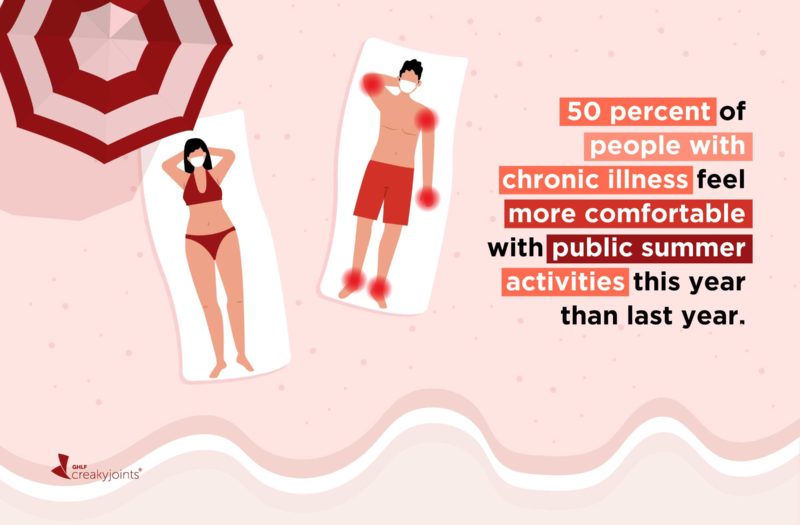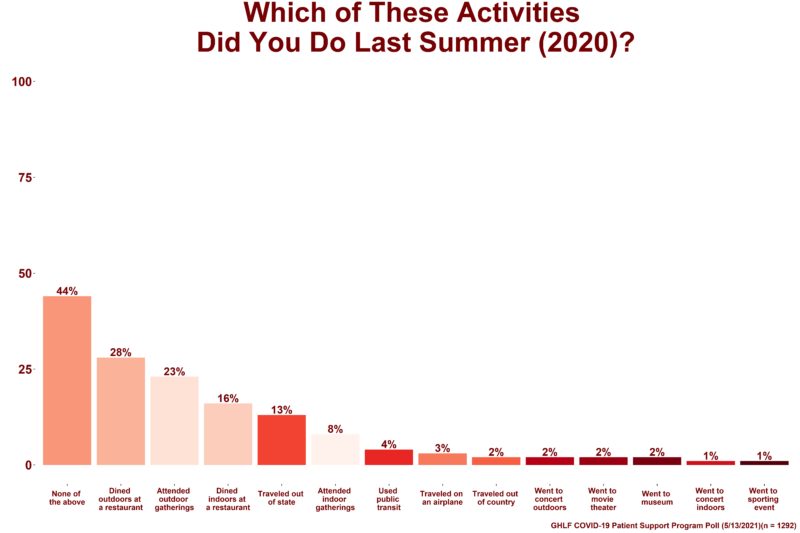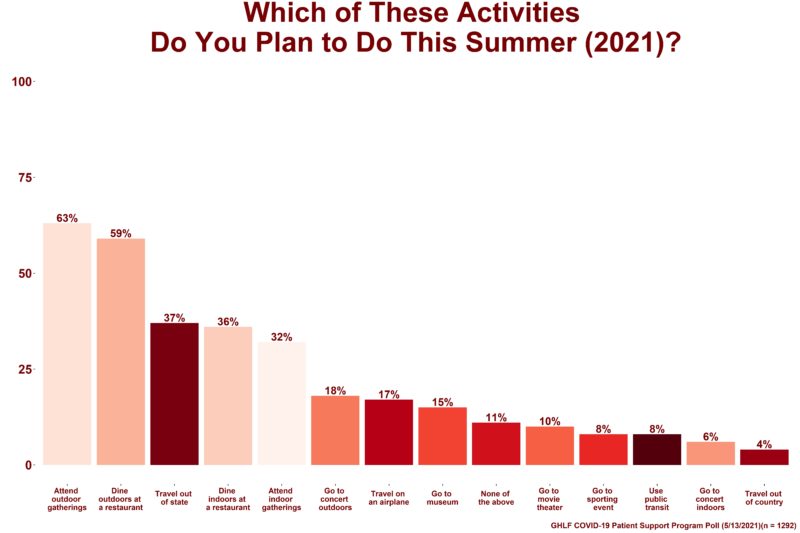Learn more about our FREE COVID-19 Patient Support Program for chronic illness patients and their loved ones.
Summertime has long been synonymous with big backyard barbecues, beach getaways, and spontaneous adventures. But the summer of 2020 was obviously different. The COVID-19 pandemic changed the carefree days of summer into ones that felt anxiety-ridden. Vacations were cancelled. Weddings were rescheduled or done over Zoom. Spontaneous social gatherings no longer existed; any meetups had to be carefully planned with all precautions in mind.
But last summer, everyone was in the same unvaccinated boat. This year, things are very different. While people who are fully vaccinated may feel like they can safely make summer plans and start getting back to “normal,” those who are immunocompromised still have concerns, especially in light of recent mask and social distancing guidance from the U.S. Centers for Disease Control and Prevention (CDC) that has led to many states rolling back their mask-wearing restrictions.
Although the number of new COVID-19 cases in the U.S. is decreasing daily, they are actually still on par with numbers from last year. On May 17, 2021, there were 19,483 new cases reported, according to the U.S. Centers for Disease Control and Prevention’s (CDC) COVID Data Tracker. This is about 5 percent less than the number of new COVID cases reported on May 17, 2020 (20,433 new cases, according to the COVID Tracking Project.)
Unlike last year, however, COVID-19 vaccines are available to anyone who is eligible; anyone 16 years or older in the U.S. can receive the Moderna or Johnson & Johnson vaccine, while the CDC recently recommended the Pfizer COVID-19 vaccine for anyone 12 years or older. Being fully vaccinated means you can safely do more activities; the CDC’s guidance says fully vaccinated people can:
- Resume activities without wearing masks or physically distancing, except where required by federal, state, local, tribal, or territorial laws, rules, and regulations, including local business and workplace guidance
- Resume domestic travel and refrain from testing before or after travel or self-quarantine after travel
- Refrain from testing before leaving the United States for international travel (unless required by the destination) and refrain from self-quarantine after arriving back in the United States
- Refrain from testing following a known exposure, if asymptomatic, with some exceptions for specific settings
- Refrain from quarantine following a known exposure if asymptomatic
- Refrain from routine screening testing if feasible
Fully vaccinated means it’s been at least two weeks since the second dose in a two-dose series, like Pfizer or Moderna, or two weeks since a single-dose vaccine, like Johnson & Johnson.
So how do all these factors affect summer planning for people with chronic illnesses?
A recent poll of 1,292 people, conducted by the Global Healthy Living Foundation (GHLF) as part of its COVID-19 Patient Support Program, aimed to gain insight into how people with chronic illnesses plan to spend summer 2021 — and how those plans compare to those of summer 2020. Comfort level plays a huge role in making plans during a global pandemic, especially for people who are immunocompromised who don’t know exactly how COVID-19 will affect them or how well the COVID-19 vaccine will protect them.
When asked if they will feel more comfortable doing activities in public this summer compared to last summer, 50 percent of respondents said they would, 20 percent of patients said they would not, and 31 percent said they were unsure.
Most respondents said they were fully vaccinated or would be before the summer; only about 15 percent of respondents said they were not.
Not surprisingly, patients’ comfort levels varied widely based on the activity.
Here are some insights into what activities people with chronic illnesses feel comfortable doing this summer — and what precautions they will take during them.
Last summer, people with chronic illness were most comfortable dining outdoors or attending outdoor gatherings with friends and family
From May to June of 2020, daily COVID-19 cases in the United States ranged from the 16,000s to the 22,000s, according to the COVID Tracking Project. Though the numbers were still high, they were also lower than they’d been in April 2020. So, states started lifting certain restrictions, restaurants reopened for outdoor dining, and people started taking off masks in outdoor settings. And then the summer surge hit. On June 30, 2020, there were 47,012 new COVID cases reported in the U.S. — almost double the number of cases from two weeks prior. A week later, on July 7, the number rose to 50,989 new COVID cases.
The rise in daily reported cases, combined with the caution that comes with having a compromised immune system, helps explain why so few members of the chronic illness community participated in activities last summer.
When asked to select all activities they participated in during summer 2020:
- 4% used public transit (train, subways, etc.)
- 3% traveled on an airplane
- 13% traveled out of state, province, or region
- 2% traveled out of the country
- 1% went to a sporting event
- 28% dined outdoors at restaurants
- 16% dined indoors at restaurants
- 2% went to a movie theatre
- 2% went to a museum
- 2% went to an outdoor play or music concert
- 1% went to an indoor play or music concert
- 23% attended outdoor parties and gatherings with friends and family
- 8% attended indoor parties and gatherings with friends and family
- 44% didn’t participate in any of the listed activities
This summer, people with chronic illness are planning to travel, dine indoors, and attend indoor gatherings more than they did last year
The ongoing decline in daily COVID-19 cases and the fact that many people are vaccinated may provide a sense of comfort for people who want to have a more active summer than last year. But given the limited information as to how effective the vaccine is in adults with compromised immune systems, immunocompromised people report being hesitant to engage with many summer activities, particularly traveling and being in large group settings, such as concerts. Still, survey participants are interested in participating in more activities — especially outdoor ones — this summer than last summer.
When asked to select all activities they plan to participate in during summer 2021:
- 8% plan to use public transit (train, subways, etc.)
- 17% plan to travel on an airplane
- 37% plan to travel out of state, province, or region
- 4% plan to travel out of the country
- 8% plan to go to a sporting event
- 59% plan to dine outdoors at restaurants
- 36% plan to dine indoors at restaurants
- 10% plan to go to a movie theatre
- 15% plan to go to a museum
- 18% plan to go to an outdoor play or music concert
- 6% plan to go to an indoor play or music concert
- 63% plan to attend outdoor parties and gatherings with friends and family
- 32% plan to attend indoor parties and gatherings with friends and family
- 11% don’t plan to participate in any of the listed activities
People with chronic illness are still proceeding with caution as they enter the summer season
While the CDC’s recently released guidance offers an enticing menu of newfound freedoms for fully vaccinated people, those who are immunocompromised don’t necessarily feel like these options are right for them.
In fact, the CDC says on its website that “if you have a condition or are taking medications that weaken your immune system, you may NOT be fully protected even if you are fully vaccinated. Talk to your health care provider. Even after vaccination, you may need to continue taking all precautions.”
In the free response section of the poll, where people could share general thoughts about making summer plans during a pandemic, many wrote they will still use precautions like social distancing and masks.
“I’m somewhat more comfortable now with being vaccinated, but still cautious and wearing masks, hand sanitizing, and social distancing,” one person wrote. “We’re not out of the woods yet with virus spread and vaccines are just one tool in actively managing the spread.”
“Due to my medical conditions, I know that I will still wear a mask in many situations,” another patient wrote. “But I plan to do a lot more than what I did in 2020 for my own mental health.”
“I’m hoping there will be more information on how effective the vaccine [is] for immunocompromised people, which will ultimately decide plans,” one person shared. “Until then, we will continue as though I am unvaccinated.”
Several patients noted that being around unvaccinated people makes them “anxious,” and they would either avoid or exercise extra caution around those who have yet to be fully vaccinated.
“As more things open up and mask restrictions are eased, I think that it will be harder to feel safe because there will still be people who aren’t vaccinated,” one person wrote. “As an immunosuppressed person, I am still at risk.”
“I will still take precautions as if I didn’t have the vaccine and will stay away from unvaccinated friends,” on person wrote.
Another patient echoed that sentiment, writing, “even though I am fully vaccinated I am still anxious about spending time with people who may not be vaccinated. I will still take extra precautions whenever possible.”
One person even said that making plans for this summer is “in some weird way, more difficult” than making plans for last summer. “Because I am not sure how effective the vaccine is for me, I will have a different level of discomfort as my peers and family, who are protected by the vaccine,” they wrote. “As more activities are planned, it puts me in a place of much more decision making and awkwardly explaining myself to others.”
As the COVID-19 pandemic continues, it is important for patients and their loved ones to stay informed about the latest guidance and news. The Global Healthy Living Foundation is committed to providing ongoing education about COVID-19 news and how it pertains to the chronic illness and immunocompromised community. Follow all of our COVID-19 coverage here.
Get Free Coronavirus Support for Chronic Illness Patients
Join the Global Healthy Living Foundation’s free COVID-19 Support Program for chronic illness patients and their families. We will be providing updated information, community support, and other resources tailored specifically to your health and safety.
About the Patient Support Program Quick Poll
Members of our program have underlying health issues — such as inflammatory arthritis and other autoimmune conditions, heart disease, lung disease, diabetes, and more — that may increase their risk for COVID-19 complications. They are interested in understanding the best ways to stay safe during the pandemic and to be part of a community of people with similar concerns, questions, and fears.
Advisory Committee on Immunization Practices. U.S. Centers for Disease Control and Prevention. May 12, 2021. https://www.cdc.gov/vaccines/acip/meetings/slides-2021-05-12.html.
Interim Public Health Recommendations for Fully Vaccinated People. COVID-19. U.S. Centers for Disease Control and Prevention. May 13, 2021. https://www.cdc.gov/coronavirus/2019-ncov/vaccines/fully-vaccinated-guidance.html.
Lastoe S, et al. From coast to coast of the United States, scenes from reopened restaurants in the coronavirus era. CNN. July 2, 2020. https://www.cnn.com/travel/article/outdoor-dining-united-states-covid-19/index.html.
Trends in Number of COVID-19 Cases and Deaths in the US Reported to CDC, by State/Territory. COVID Data Tracker. U.S. Centers for Disease Control and Prevention. https://covid.cdc.gov/covid-data-tracker/#trends_dailytrendscases.
US Daily Cases. The COVID Tracking Project. The Atlantic. https://covidtracking.com/data/charts/us-daily-positive.








